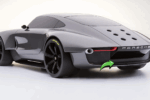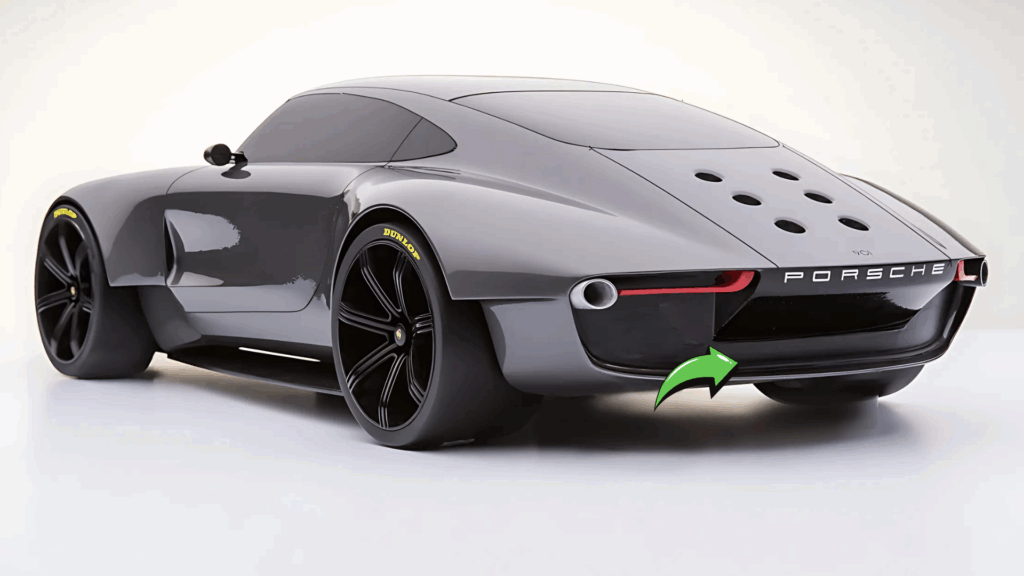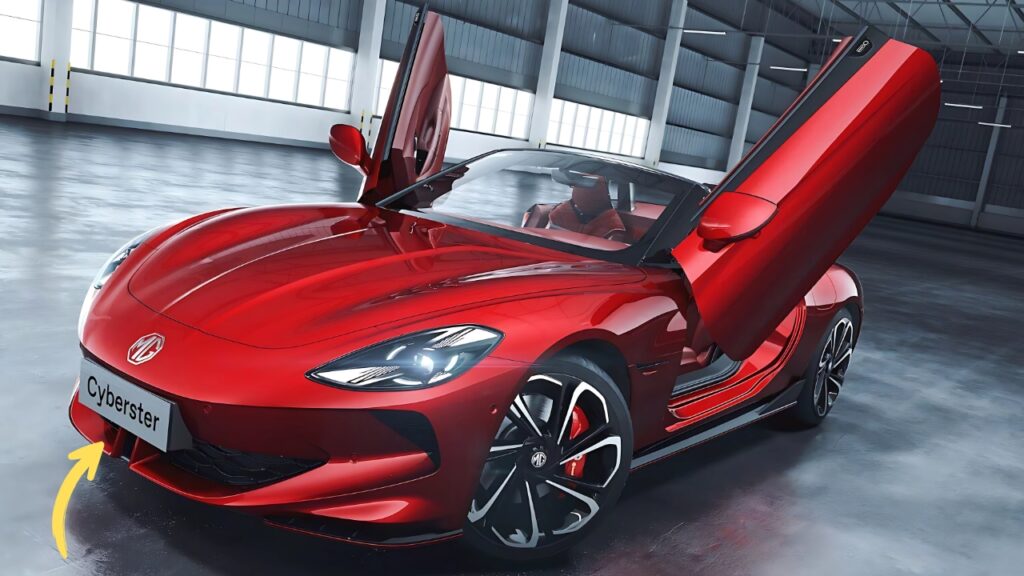BYD Denza Z Concept: In the fast-moving world of electric cars, it’s tough to get excited about even the wildest new concept, but few have made a bigger splash than BYD’s bold new design.
The Z is a definitive statement of intent by China’s automotive powerhouse; it takes on and challenges one of the most iconic sports cars of all time – the Porsche 911.
This electric grand tourer isn’t just another EV in a crowded field; it’s a reimagining of what performance heritage can mean in the age of electrification.
Table of Contents
The Fusion of Tradition and Innovation
Tradition and Modernity in Balance in the Denza Z Concept The automotive industry has always combined tradition with progress, but seldom has it been depicted in such a stunning manner as with the Denza Z Concept.
The Chinese company’s luxury sub-brand has produced a car that nods to classic sports car proportions, yet explores what electric powertrains could enable. The effect is both familiar and radical.
You know the Denza Z looks instantly recognizable among car enthusiasts – the long bonnet, dramatic roof line and athletic haunches all speak a design language honed by the best of Stuttgart over the years.
But this is not simply pastiche. In creating such Chinese inflections throughout, BYD’s designers have produced a car which acknowledges its source and gloriously shows its own identity.
“We wanted to do something that pays respect to automotive history yet starts a new story,” says Li Chen, lead designer of the Denza Z project. “The proportions could seem familiar, but the details and how they are being executed are ours and ours alone.
Performance Creds for a New Time
The 911 comparisons go further than skin-deep. Performance You can work out the performance figures yourself – they read as a direct snub to the Germans. BYD has designed the Denza Z to be no slouch.
The concept features a twin-motor system capable of more than 800 horsepower — heady numbers that may help explain why it’s said to do 0-60 mph in a mere 2.5 seconds, putting it in supercar territory.
Not for the Z the limitations that are part and parcel of a traditional sports car; Even when they pack four electric motors and a contemporary e-drive system.
The battery pack is located precisely to achieve optimal 50:50 weight distribution, and in an instant, the blistering acceleration from the electric motors will make you forget that this isn’t the most advanced internal combustion engine in the world.
Most impressively, Ford is estimating a range of above 400 miles after a single charge – one of sports car fans’ biggest beefs with electric models.
The Denza Z is its effort to show that long-distance grand touring and lapping-day performance don’t have to be two separate and distinct things in the electric age.
Technological Savvy
The balancing of heritage and modernity also continues inside the cabin of Denza Z. Driver-oriented, the cockpit draws inspiration from classic sports cars, but is built with the latest technologies.
The dashboard features a panoramic curved display n everything is controlled through this interfacePhysical buttons have also been preserved for select functions as a subtle tribute to the tactile experience driving fans love so much.
The Z is not short of technological prowess either, and not just in the infotainment department. The design provides a glimpse into BYD’s newest battery technology with cell-to-pack setup which not only ensures high energy density, but also reduces weight.
Including an 800-volt electrification system, the platform supports super-fast charging and BYD says you can expect the crossover to charge to 80 percent of its battery capacity in less than 20 minutes.
There’s plenty of ADAS features too, and while BYD says these are designed to help the driver, not perform the job for them, that’s not to say it isn’t luxurious inside.
“We feel that technology should serve the driver, not the other way around,” says Wei Zhang, chief engineer of the project. “The relationship between driver and car is still sacred.
Market Disruption and Implications for the Industry
The presentation of Denza Z Concept is more than simply the debut of another luxury EV – it is the time to rethink the conceptions of luxury mobility in the global automotive industry.
For decades, the high-performance luxury segment has been ruled by European manufacturers — while Asian brands, even performance-oriented models from them, have remained consigned to the more practical side of things. The Denza Z seeks to upset the apple cart in that regard.
Industry analysts say the move mirrors growing self-assurance among Chinese automakers. ‘BYD is no longer just competing on price or practicality,’ says Sarah Johnson, senior automotive analyst at Global Market Research.
“With the Denza Z, they’re expressing the ambition to battle and fight in the territory that no non-European brand was supposed to meddle or compete: the heritage, the emotion, the performance.”
The challenge comes at a particularly critical time. While established carmakers are struggling with electrification, Chinese groups such as BYD, which have already existing electric vehicle supply chains and battery production capabilities, suddenly have an upper hand.
And the Denza Z makes the most of that, blending BYD’s engineering know-how with more advanced design language.
Significance of Culture and BrandIdentity
The choice to tease an electric vehicle that so closely mirrors a Western sports car raises fascinating points about cultural and automotive identity prevalence. But instead of aping European styling the Denza Z refreshes those influences through a Chinese perspective.
“We are beginning to see the dawn of real new global design language,” observes automotive design critic Elena Martinez.
“The Denza Z makes no apologies for where it came from, though neither does it conceal its Chinese roots. There’s a confidence there that didn’t exist even five years ago.”
The cross-pollination of cultures continues with the name of the vehicle. Although “Denza” is BYD’s premium brand, the “Z” in this model’s name has multiple interpretations in various cultures, not only being the last letter of English language, but also, in the case of it sounding like it’s Mandarin name, it happens to be the word for “excellence” or “son.” This is a duality that speaks to the international aspirations of the brand.
Market Reception and Production Opportunities
Like many a concept car, there are bound to be questions about whether or not we’ll see a production version of the Denza Z as it appears now.
BYD, which has so far been enigmatic on timeframes, has suggested that the new model could be launched within two years. Trade sources say: around 80% of the concept’s design will be carried over to the production model.
Reception from automotive journalists has been lukewarm at best, tempered praises for the concept vehicle’s bold design and impressive technical specs.
Purists will have their doubts, though — especially when it comes to the emotional interaction at the wheel that has long been the hallmark of performance machines like the Porsche 911.
“Quality and specs have to be impressive,” says Marcus Schmidt, editor of European Car Magazine. “But when it comes to sports cars, numbers never tell the full story. This is something intangible — a soul — that cannot be communicated in a press release.
The proof of the pudding will be in the eating, of course — once drivers actually get behind the wheel of the car.
The Larger Electric Revolution
The only companies that can make the Denza Z don’t really need it. As regulations become more and more tilted toward electric and consumer demands change, even the most hardcore performance marques are getting on board with electric vehicles.
In fact, Porsche has already shown how a legacy automaker can bring its performance heritage into the electric age with its electric sedan, the Taycan.
Here, the Denza Z not only represents competition from a previously unexpected direction but en question not just us as racing drivers but where the future of performance cars could be heading.
And if electricity can together provide better performance, accelerate with additional zip, center weight in a friendlier manner and, importantly, make driving more fun, what does any of that mean for the sports car as we understand it? Surely the answer lies in the subjective experience of sound, feel and even emotive engagement; areas where heritage brands still hold all the cards.
A New Volume of Automotive History has been Written
Whether or not the Z can now will the barriers that stop it from usurping the performance icons we know — the Porsche 911 and its ilk is left to be seen.
What can’t be denied is that its very existence is a bellwether for a new phase of the global auto business: one that’s seeing hitherto-unassailable pecking orders overturned and bold new rivals asserting their place in what were once the most exclusive parts of the trade.
Certainly both for fans and those who seriously follow this industry, this is a cool, progressing development. As companies like BYD challenge entrenched manufacturers to defend their turf, the vehicles that result are likely to break new ground both in terms of what they can do and how they look.
The car doesn’t only ask if an electric vehicle can keep up with a Porsche 911 – so do most EV drivers – but also challenges us to consider what performance heritage really means in an age of revolutionary technological change.
That answer could reshape our understanding of what constitutes a proper sports car in the 21st century and leave gearheads around the world paying attention.











